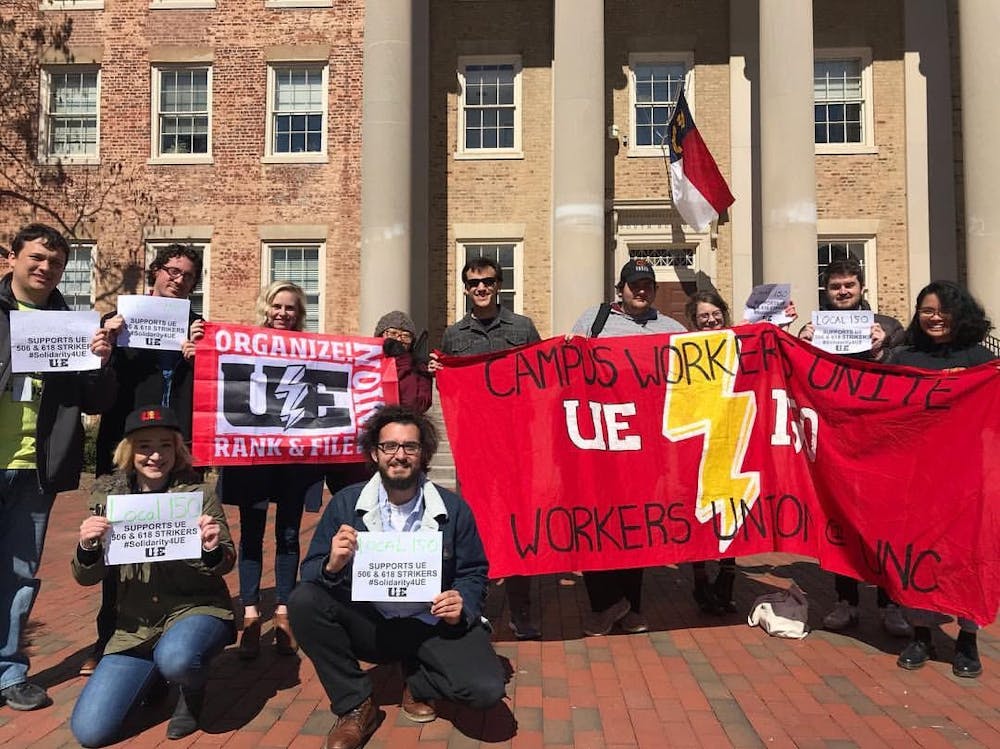A March 2019 message to the directors of UNC's graduate studies from Graduate School Dean Steve Matson explained that the change was made to address inequities in the way mandatory fees for grad students have been paid.
“This change is an important step forward in easing the burden of those fees that erode the full value of the stipend provided for teaching and research assignments, and to increase the competitiveness of Carolina’s graduate programs to recruit the best graduate students," Matson said in the message.
“Across every aspect of your job, having that extra money makes things a lot more comfortable,” said Eli LoCicero, a fifth-year grad student in the economics department.
LoCicero has been a member of UE150 for two years. His past efforts for the union include conducting a survey in 2018 of student pay across various graduate departments. The survey collected comments and data about stipends, hours and loans from 520 respondents, separated by department, year, pay scheme and degree.
LoCicero said not much data on the matter had been collected before this study. One main takeaway: about 81.6 percent of graduate workers made less than the living wage in Orange County, as defined by the Massachusetts Institute of Technology living wage calculator.
While the removal of these fees is a financial boost for UNC grad students, LoCicero said there’s still a lot more to be done.
“Getting that extra $2,000 back means that I make $15,700 over nine months. I get to keep it all rather than dropping down to $13,700,” he said. “But, $15,700 is still not much money. It is still just scraping by, for everybody, and so that means that there’s a lot more fighting to do.”
What is UE 150?
Part of the national union UE — an abbreviated title for United Electrical, Radio and Machine Workers of America — UE150 is the North Carolina Public Service Workers Union.
As a member-run organization, UE150 members elect representatives for their union chapter, called “stewards,” and for the UE150 state executive board.
“We are an organization that fights every day to improve the lives of public workers across our state. Our immediate goals are better wages and working conditions and protection from unfair treatment. Our long-term goal is collective bargaining rights for public employees,” the organization's website states.
The union holds monthly meetings run by an organizer, usually lasting around three hours. The meetings focus on specific agenda items, and a member of the state union sometimes comes to share their input and experience.
To get the day's news and headlines in your inbox each morning, sign up for our email newsletters.
Though UE150 is a labor union, the state of North Carolina does not allow collective bargaining. North Carolina is one of only three states with such a statutory ban.
Ana Pardo, policy advocate for the North Carolina Justice Center Workers’ Rights Project, said while other North Carolina workers have collective bargaining rights, employees of the state government are expressly forbidden from it.
“For public sector employees, obviously they can’t unionize yet in the state of North Carolina, but there’s many, many other things that you can do in the workplace besides unionizing that can help get you there in terms of having a dignified, fair work place,” Pardo said.
Knorek said it’s in the University’s best interest to improve working conditions.
“Just because you can’t legally enter into a collective bargaining agreement, the power of unions and the power that the workers have is that we can withhold labor,” she said. “The University works because we do. We are the TA’s, we write grants to bring money in, we write papers that look good for the University and for our PI’s and labs, and we teach the undergraduates.”
While UE150 includes includes state and city workers, membership also extends to grad student workers at UNC. Since UNC is a public university, the paid grad students are technically state employees.
This classification extends to campus workers as well, such as UNC housekeeping and dining workers. But because North Carolina is a right-to-work state, LoCicero said, only members who fill out a form and pay dues are considered union members.
The distinction between graduate student workers and campus workers has been made clearer since last month, when UE150 decided to create two sister organizations.
The split
The needs of grad student workers and campus workers were too different to proceed effectively, said several UE150 grad student members.
“When we would have our meetings, it would frequently be almost 100 percent dominated by grad workers,” said Knorek. “And we realized, because the campus workers weren’t being represented as well as they could be, that it made sense to have, essentially, two groups who are sister chapters of UE150."
She also cited language differences and scheduling difficulties as reasons for the split, as campus workers more often have families and work shifts that change their hours.
“There were just these core differences that, from an organizational standpoint, it made sense to give the campus workers the power to speak for themselves and to organize around issues that they find important or relevant to them,” she said.
Knorek said the two groups will have separate meetings and organize within their own workplaces.
“It’s a soft split,” said Miranda Elston, a seventh-year Ph.D. art history grad student and UE150 member.
Elston said the union was very small when it started, so the two groups huddled together for support. Now, they will have separate spaces for issues facing each of them.
Both Elston and Knorek said it is too soon to tell how the split might affect the union.
“I’m sure that there will be challenges in the future as we kind of navigate this split,” Knorek said. “They haven’t been made apparent to me yet.”
@elizltmoore
special.projects@dailytarheel.com




